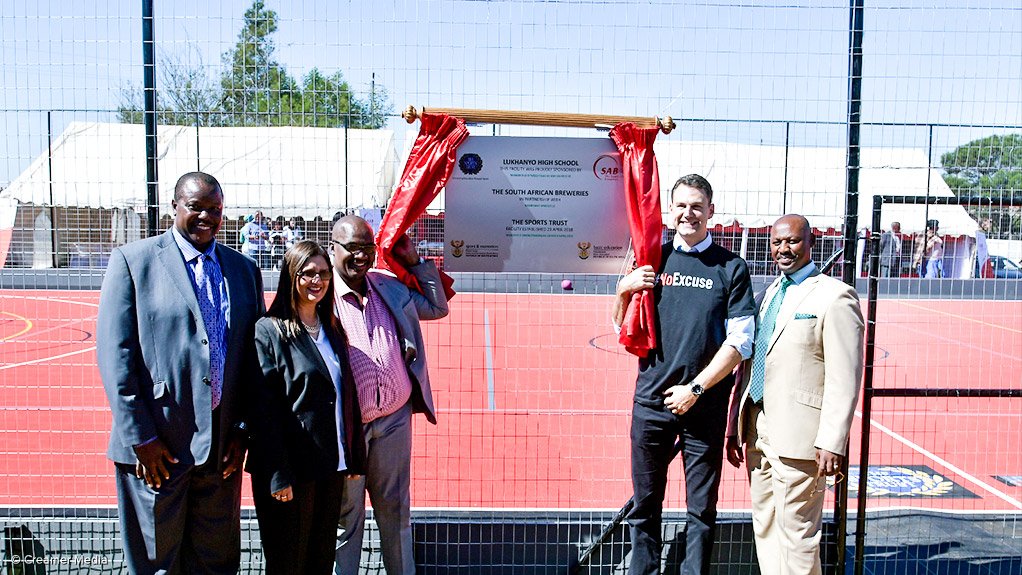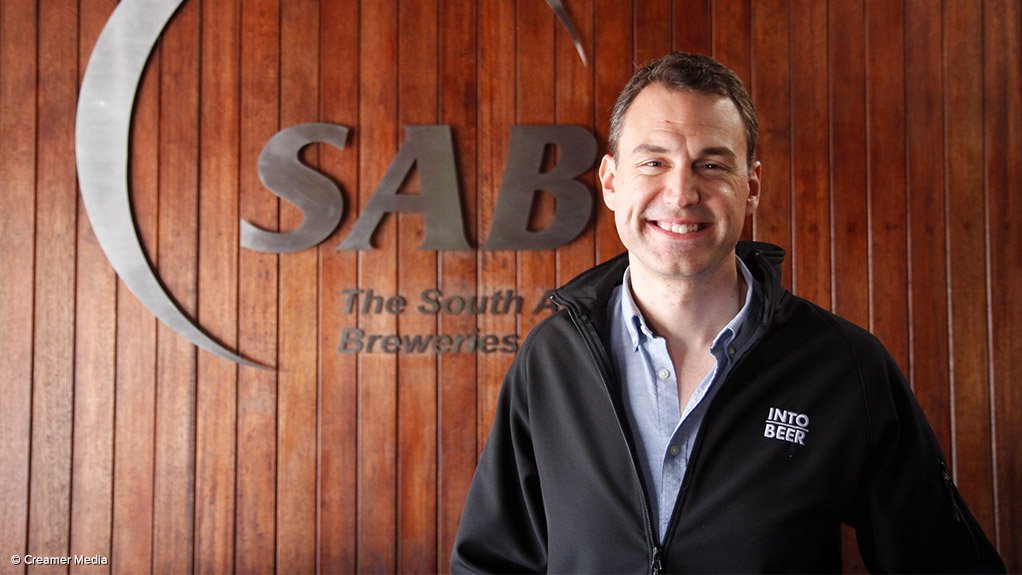SAB, AB InBev on track with five-year public interest commitment investments



Photo by Dylan Slater
SAB and AB InBev Africa president Ricardo Tadeu
Photo by Creamer Media
South African Breweries (SAB), together with its parent company Anheuser-Busch InBev (AB InBev), has spent R209-million on Public Interest Commitments (PICs) in 2017, with investments in agriculture, enterprise development and societal benefits programmes in South Africa.
With the merger of SAB and AB InBev in 2016, the parties agreed to invest R1-billion in South Africa between 2017 and 2021.
Of the R209-million invested in 2017, R117-million was earmarked for agriculture; R67-million for enterprise development; and R25-million for societal benefits.
SAB and AB InBev Africa president Ricardo Tadeu on Monday said investments by companies such as SAB and AB InBev could be truly transformative in changing individual and community lives.
“We are committed to help change the face of South Africa’s economic demographic through the smart development of our suppliers and of entrepreneurs in the wider economy.
“We are also able to support emerging farmers, enhancing the hops and barley sectors and playing a part in building the skills [that] we need for food security,” he stated.
SAB and AB InBev consider agriculture to be the area of greatest opportunity for economic renewal and impact. Therefore, about 61% of the total R1-billion PIC investment will be invested in growing South Africa’s agricultural sector to become a net exporter of barley and hops.
The PIC agreement is intended to create 2 600 jobs in the agriculture sector.
SAB has expanded this commitment to create 10 000 jobs across other sectors, primarily through entrepreneurship, over the five-year period.
The five-year PIC target for agriculture includes the creation of a further 800 emerging farmers and a further 20 commercial farmers; expanding yearly barley production to 475 000 t; investing in research and development and technology to benefit emerging and commercial farmers; and creating new business opportunities.
SAB and AB InBev have also established an agriculture task team, which aims to deliver value and facilitates alignment with government stakeholders, including the Department of Agriculture, Forestry and Fisheries.
The companies also established Farmsol – an emerging grower development implementation partner for SAB and the agricultural industry.
Other focus areas included the integration of SAB’s existing emerging grower programmes, Women in Maize and Go Farming, as well as the development of a Model Farm plot, in Caledon, to establish best farming practices that can be replicated across the farming sector.
Tadeu concluded that alongside SAB and AB InBev’s PIC vision for agricultural development, the goal is to establish a sustainable agriculture programme within South Africa that will take SAB beyond its PIC goals in 2021 and meaningfully impact on the sector for years to come.
Meanwhile, with regard to the five-year commitment in enterprise development, the companies have established a dedicated business incubator facility – the SAB Accelerator, which is focused on developing black-owned and black women-owned suppliers and content development for online entrepreneurship training programmes through SAB Kickstart.
The companies also provided new and existing suppliers, as well as entrepreneurs, with business training; and employed ten dedicated business coaches and ten engineers to support the supplier and entrepreneur programmes.
Additionally, ownership transformation of businesses in the supply chains was undertaken through the SAB Thrive Fund, which helped to establish the first black woman hops farm-owner in George, in the Western Cape.
Further, SAB and AB InBev spent R25-million in 2017 towards societal benefits, including supporting and developing alternative energy use at SAB operations; supporting education and the use of alternative energy within South African communities; and promoting a sustainability programme aimed at reducing waste and encouraging recycling, as well as the preservation of water.
Additionally, the companies enhanced their existing youth sports programmes and established afterschool educational initiatives; funded 40 engineering and agronomy scholarships; and sponsored an additional 200 learnerships for those who have no formal education and the unemployed.
Comments
Press Office
Announcements
What's On
Subscribe to improve your user experience...
Option 1 (equivalent of R125 a month):
Receive a weekly copy of Creamer Media's Engineering News & Mining Weekly magazine
(print copy for those in South Africa and e-magazine for those outside of South Africa)
Receive daily email newsletters
Access to full search results
Access archive of magazine back copies
Access to Projects in Progress
Access to ONE Research Report of your choice in PDF format
Option 2 (equivalent of R375 a month):
All benefits from Option 1
PLUS
Access to Creamer Media's Research Channel Africa for ALL Research Reports, in PDF format, on various industrial and mining sectors
including Electricity; Water; Energy Transition; Hydrogen; Roads, Rail and Ports; Coal; Gold; Platinum; Battery Metals; etc.
Already a subscriber?
Forgotten your password?
Receive weekly copy of Creamer Media's Engineering News & Mining Weekly magazine (print copy for those in South Africa and e-magazine for those outside of South Africa)
➕
Recieve daily email newsletters
➕
Access to full search results
➕
Access archive of magazine back copies
➕
Access to Projects in Progress
➕
Access to ONE Research Report of your choice in PDF format
RESEARCH CHANNEL AFRICA
R4500 (equivalent of R375 a month)
SUBSCRIBEAll benefits from Option 1
➕
Access to Creamer Media's Research Channel Africa for ALL Research Reports on various industrial and mining sectors, in PDF format, including on:
Electricity
➕
Water
➕
Energy Transition
➕
Hydrogen
➕
Roads, Rail and Ports
➕
Coal
➕
Gold
➕
Platinum
➕
Battery Metals
➕
etc.
Receive all benefits from Option 1 or Option 2 delivered to numerous people at your company
➕
Multiple User names and Passwords for simultaneous log-ins
➕
Intranet integration access to all in your organisation




















